2016届中考英语《第九章:英语动词的用法》复习讲义
文档属性
| 名称 | 2016届中考英语《第九章:英语动词的用法》复习讲义 |
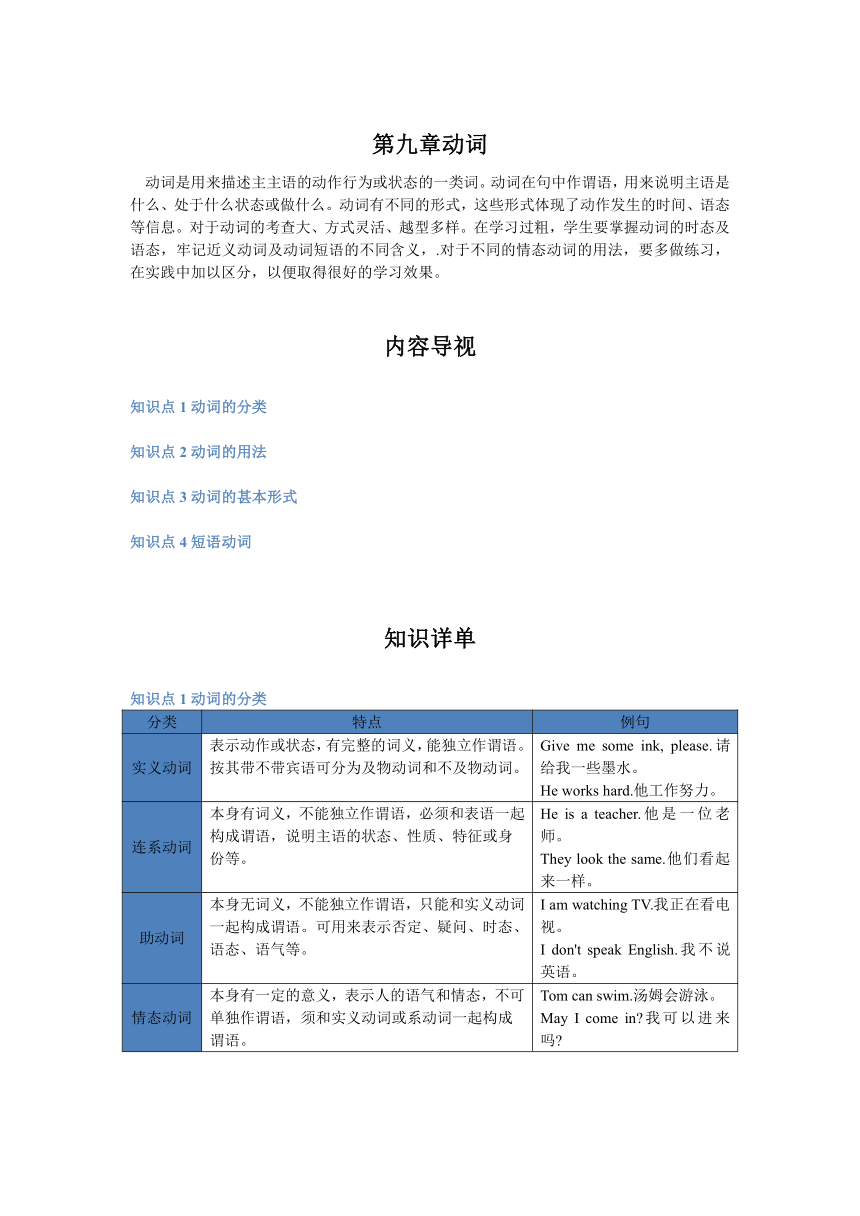
|
|
| 格式 | zip | ||
| 文件大小 | 28.8KB | ||
| 资源类型 | 教案 | ||
| 版本资源 | 通用版 | ||
| 科目 | 英语 | ||
| 更新时间 | 2016-03-16 00:00:00 | ||
图片预览

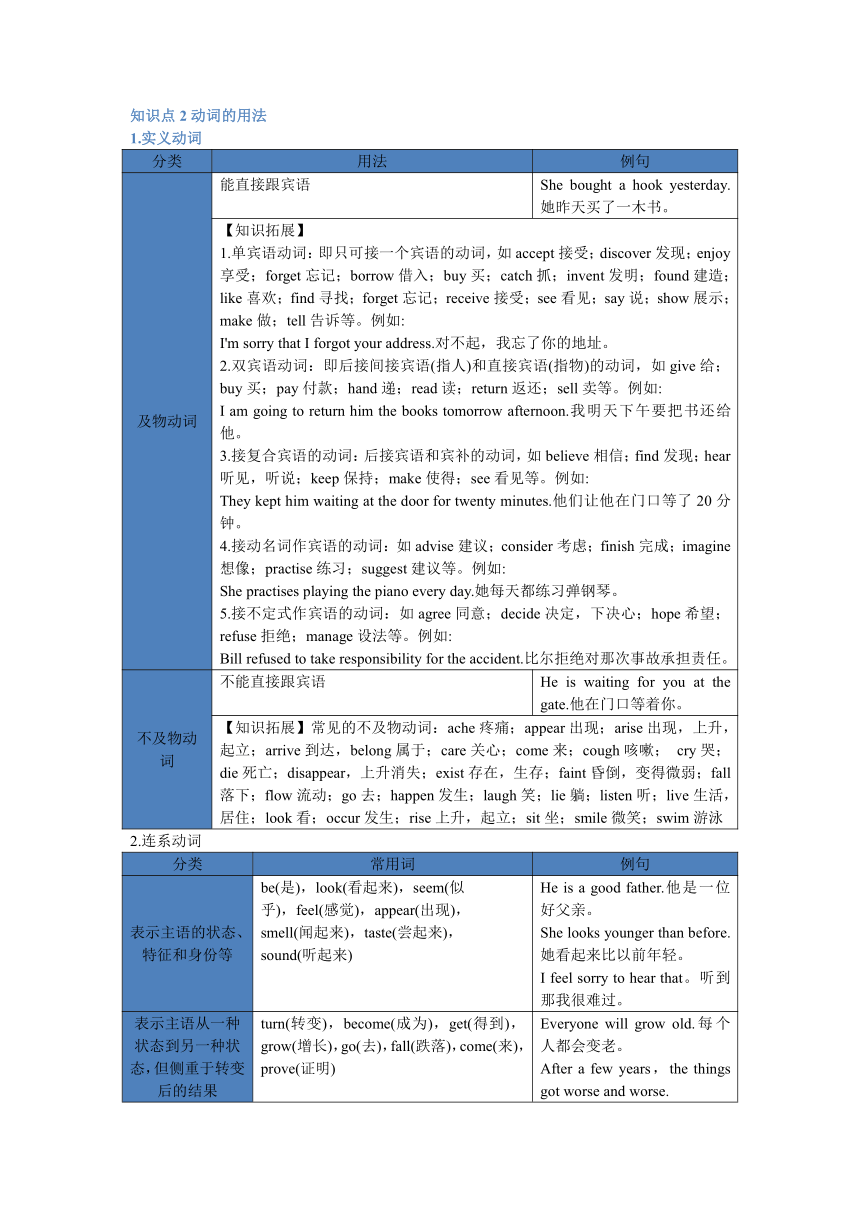
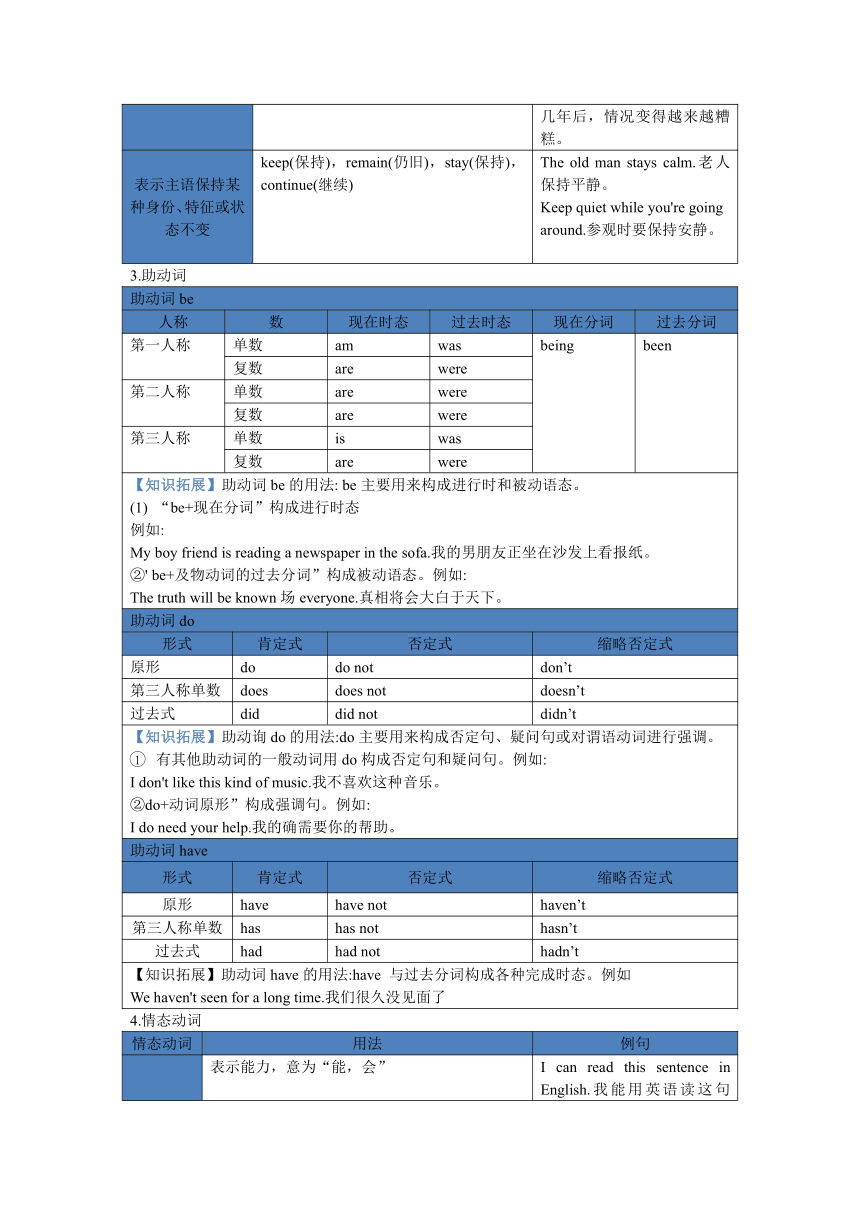
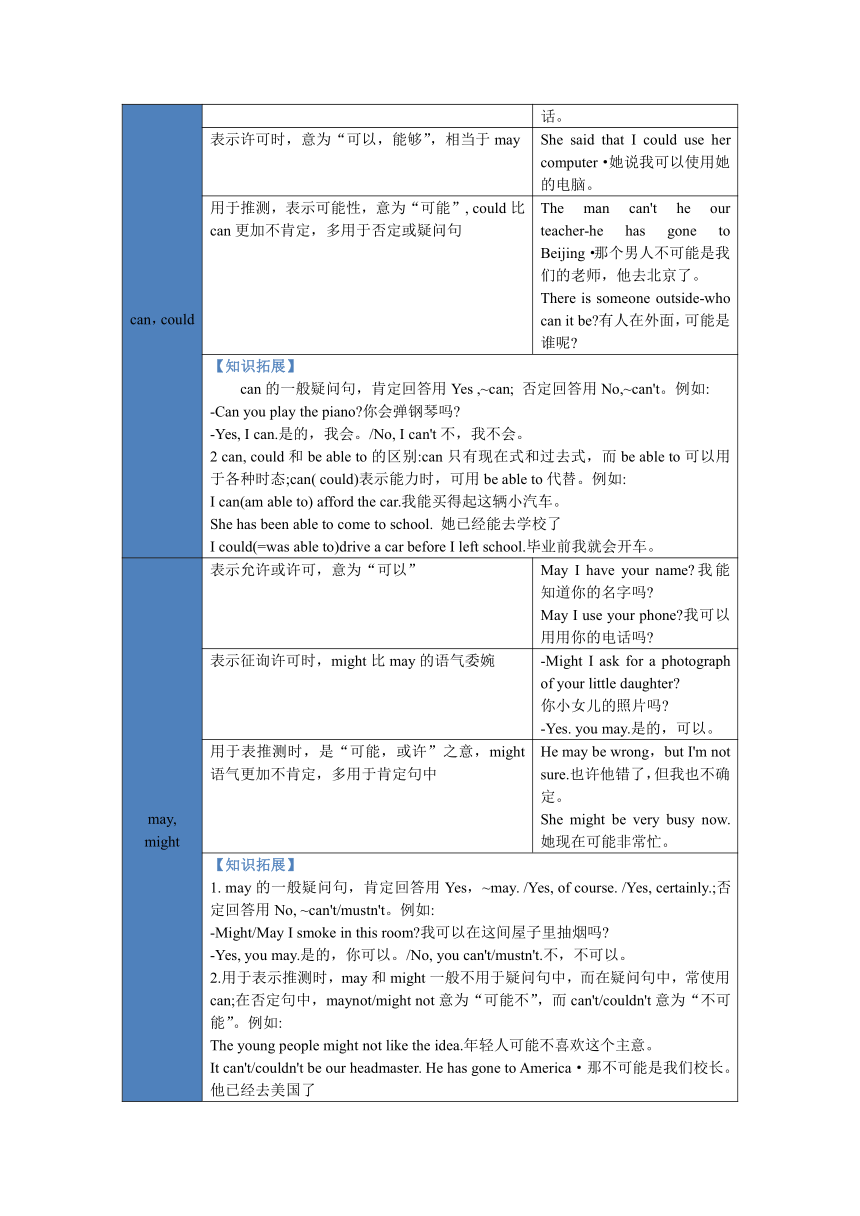
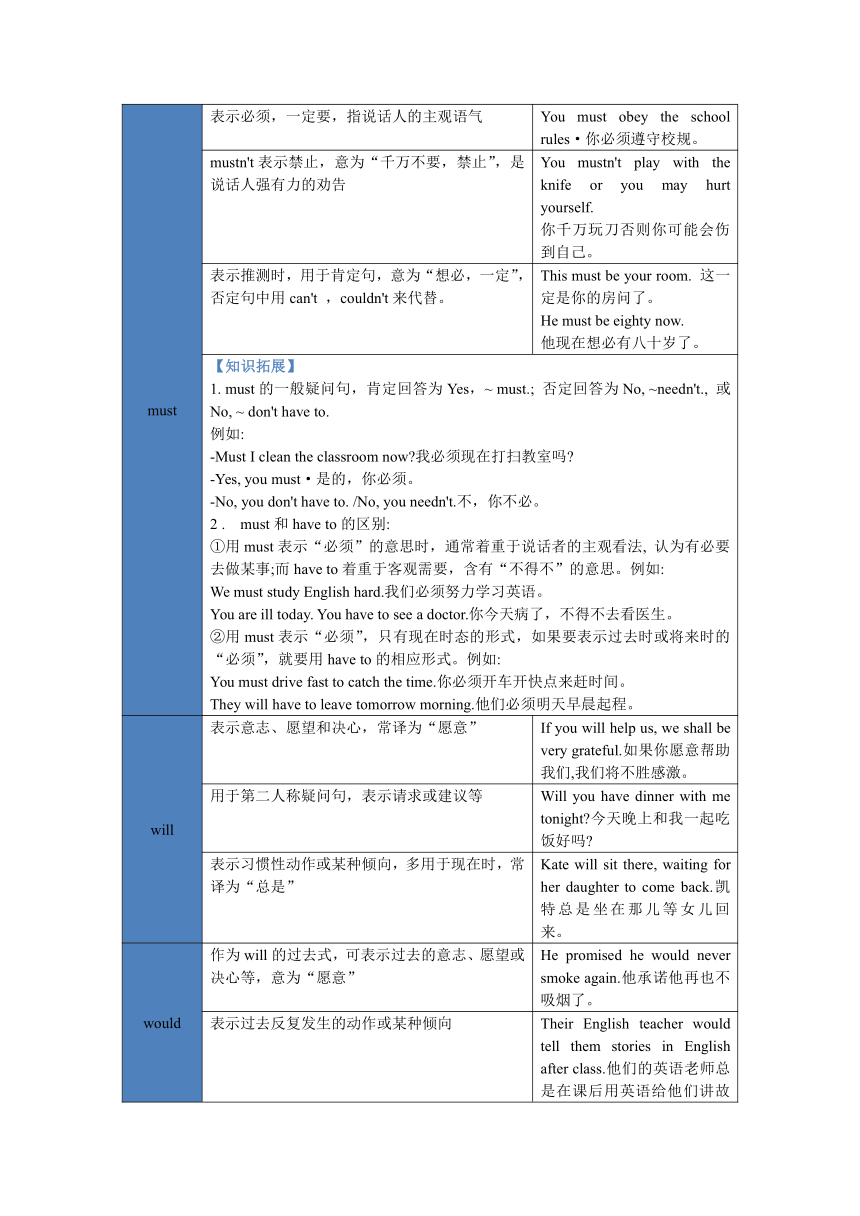
文档简介
第九章动词
动词是用来描述主主语的动作行为或状态的一类词。动词在句中作谓语,用来说明主语是什么、处于什么状态或做什么。动词有不同的形式,这些形式体现了动作发生的时间、语态等信息。对于动词的考查大、方式灵活、越型多样。在学习过粗,学生要掌握动词的时态及语态,牢记近义动词及动词短语的不同含义,.对于不同的情态动词的用法,要多做练习,在实践中加以区分,以便取得很好的学习效果。
内容导视
知识点1动词的分类
知识点2动词的用法
知识点3动词的甚本形式
知识点4短语动词
知识详单
知识点1动词的分类
分类 特点 例句
实义动词 表示动作或状态,有完整的词义,能独立作谓语。按其带不带宾语可分为及物动词和不及物动词。 Give me some ink, please.请给我一些墨水。He works hard.他工作努力。
连系动词 本身有词义,不能独立作谓语,必须和表语一起构成谓语,说明主语的状态、性质、特征或身份等。 He is a teacher.他是一位老师。They look the same.他们看起来一样。
助动词 本身无词义,不能独立作谓语,只能和实义动词一起构成谓语。可用来表示否定、疑问、时态、语态、语气等。 I am watching TV.我正在看电视。I don't speak English.我不说英语。
情态动词 本身有一定的意义,表示人的语气和情态,不可单独作谓语,须和实义动词或系动词一起构成谓语。 Tom can swim.汤姆会游泳。May I come in 我可以进来吗
知识点2动词的用法
1.实义动词
分类 用法 例句
及物动词 能直接跟宾语 She bought a hook yesterday.她昨天买了一木书。
【知识拓展】1.单宾语动词:即只可接一个宾语的动词,如accept接受;discover发现;enjoy享受;forget忘记;borrow借入;buy买;catch抓;invent发明;found建造;like喜欢;find寻找;forget忘记;receive接受;see看见;say说;show展示;make做;tell告诉等。例如:I'm sorry that I forgot your address.对不起,我忘了你的地址。2.双宾语动词:即后接间接宾语(指人)和直接宾语(指物)的动词,如give给;buy买;pay付款;hand递;read读;return返还;sell卖等。例如:I am going to return him the books tomorrow afternoon.我明天下午要把书还给他。3.接复合宾语的动词:后接宾语和宾补的动词,如believe相信;find发现;hear听见,听说;keep保持;make使得;see看见等。例如:They kept him waiting at the door for twenty minutes.他们让他在门口等了20分钟。4.接动名词作宾语的动词:如advise建议;consider考虑;finish完成;imagine想像;practise练习;suggest建议等。例如:She practises playing the piano every day.她每天都练习弹钢琴。5.接不定式作宾语的动词:如agree同意;decide决定,下决心;hope希望;refuse拒绝;manage设法等。例如:Bill refused to take responsibility for the accident.比尔拒绝对那次事故承担责任。
不及物动词 不能直接跟宾语 He is waiting for you at the gate.他在门口等着你。
【知识拓展】常见的不及物动词:ache疼痛;appear出现;arise出现,上升,起立;arrive到达,belong属于;care关心;come来;cough咳嗽; cry哭;die死亡;disappear,上升消失;exist存在,生存;faint昏倒,变得微弱;fall落下;flow流动;go去;happen发生;laugh笑;lie躺;listen听;live生活,居住;look看;occur发生;rise上升,起立;sit坐;smile微笑;swim游泳
2.连系动词
分类 常用词 例句
表示主语的状态、特征和身份等 be(是),look(看起来),seem(似乎),feel(感觉),appear(出现),smell(闻起来),taste(尝起来),sound(听起来) He is a good father.他是一位好父亲。She looks younger than before.她看起来比以前年轻。I feel sorry to hear that。听到那我很难过。
表示主语从一种状态到另一种状态,但侧重于转变后的结果 turn(转变),become(成为),get(得到),grow(增长),go(去),fall(跌落),come(来),prove(证明) Everyone will grow old.每个人都会变老。After a few years,the things got worse and worse.几年后,情况变得越来越糟糕。
表示主语保持某种身份、特征或状态不变 keep(保持),remain(仍旧),stay(保持),continue(继续) The old man stays calm.老人保持平静。Keep quiet while you're goingaround.参观时要保持安静。
3.助动词
助动词be
人称 数 现在时态 过去时态 现在分词 过去分词
第一人称 单数 am was being been
复数 are were
第二人称 单数 are were
复数 are were
第三人称 单数 is was
复数 are were
【知识拓展】助动词be的用法: be主要用来构成进行时和被动语态。(1) “be+现在分词”构成进行时态例如:My boy friend is reading a newspaper in the sofa.我的男朋友正坐在沙发上看报纸。②' be+及物动词的过去分词”构成被动语态。例如:The truth will be known场everyone.真相将会大白于天下。
助动词do
形式 肯定式 否定式 缩略否定式
原形 do do not don’t
第三人称单数 does does not doesn’t
过去式 did did not didn’t
【知识拓展】助动询do的用法:do主要用来构成否定句、疑问句或对谓语动词进行强调。有其他助动词的一般动词用do构成否定句和疑问句。例如:I don't like this kind of music.我不喜欢这种音乐。②do+动词原形”构成强调句。例如:I do need your help.我的确需要你的帮助。
助动词have
形式 肯定式 否定式 缩略否定式
原形 have have not haven’t
第三人称单数 has has not hasn’t
过去式 had had not hadn’t
【知识拓展】助动词have的用法:have 与过去分词构成各种完成时态。例如We haven't seen for a long time.我们很久没见面了
4.情态动词
情态动词 用法 例句
can,could 表示能力,意为“能,会” I can read this sentence in English.我能用英语读这句话。
表示许可时,意为“可以,能够”,相当于may She said that I could use her computer·她说我可以使用她的电脑。
用于推测,表示可能性,意为“可能”, could比can更加不肯定,多用于否定或疑问句 The man can't he our teacher-he has gone to Beijing·那个男人不可能是我们的老师,他去北京了。There is someone outside-who can it be 有人在外面,可能是谁呢
【知识拓展】 can的一般疑问句,肯定回答用Yes ,~can; 否定回答用No,~can't。例如:-Can you play the piano 你会弹钢琴吗 -Yes, I can.是的,我会。/No, I can't不,我不会。2 can, could和be able to的区别:can只有现在式和过去式,而be able to可以用于各种时态;can( could)表示能力时,可用be able to代替。例如:I can(am able to) afford the car.我能买得起这辆小汽车。She has been able to come to school. 她已经能去学校了I could(=was able to)drive a car before I left school.毕业前我就会开车。
may, might 表示允许或许可,意为“可以” May I have your name 我能知道你的名字吗 May I use your phone 我可以用用你的电话吗
表示征询许可时,might比may的语气委婉 -Might I ask for a photograph of your little daughter 你小女儿的照片吗 -Yes. you may.是的,可以。
用于表推测时,是“可能,或许”之意,might语气更加不肯定,多用于肯定句中 He may be wrong,but I'm not sure.也许他错了,但我也不确定。She might be very busy now.她现在可能非常忙。
【知识拓展】1. may的一般疑问句,肯定回答用Yes,~may. /Yes, of course. /Yes, certainly.;否定回答用No, ~can't/mustn't。例如:-Might/May I smoke in this room 我可以在这间屋子里抽烟吗 -Yes, you may.是的,你可以。/No, you can't/mustn't.不,不可以。2.用于表示推测时,may和might一般不用于疑问句中,而在疑问句中,常使用can;在否定句中,maynot/might not意为“可能不”,而can't/couldn't意为“不可能”。例如:The young people might not like the idea.年轻人可能不喜欢这个主意。It can't/couldn't be our headmaster. He has gone to America·那不可能是我们校长。他已经去美国了
must 表示必须,一定要,指说话人的主观语气 You must obey the school rules·你必须遵守校规。
mustn't表示禁止,意为“千万不要,禁止”,是说话人强有力的劝告 You mustn't play with the knife or you may hurt yourself.你千万玩刀否则你可能会伤到自己。
表示推测时,用于肯定句,意为“想必,一定”,否定句中用can't ,couldn't来代替。 This must be your room. 这一定是你的房问了。He must be eighty now.他现在想必有八十岁了。
【知识拓展】1. must的一般疑问句,肯定回答为Yes,~ must.; 否定回答为No, ~needn't., 或No, ~ don't have to.例如:-Must I clean the classroom now 我必须现在打扫教室吗 -Yes, you must·是的,你必须。-No, you don't have to. /No, you needn't.不,你不必。2 . must和have to的区别:①用must表示“必须”的意思时,通常着重于说话者的主观看法, 认为有必要去做某事;而have to着重于客观需要,含有“不得不”的意思。例如:We must study English hard.我们必须努力学习英语。You are ill today. You have to see a doctor.你今天病了,不得不去看医生。②用must表示“必须”,只有现在时态的形式,如果要表示过去时或将来时的“必须”,就要用have to的相应形式。例如:You must drive fast to catch the time.你必须开车开快点来赶时间。They will have to leave tomorrow morning.他们必须明天早晨起程。
will 表示意志、愿望和决心,常译为“愿意” If you will help us, we shall be very grateful.如果你愿意帮助我们,我们将不胜感激。
用于第二人称疑问句,表示请求或建议等 Will you have dinner with me tonight 今天晚上和我一起吃饭好吗
表示习惯性动作或某种倾向,多用于现在时,常译为“总是” Kate will sit there, waiting for her daughter to come back.凯特总是坐在那儿等女儿回来。
would 作为will的过去式,可表示过去的意志、愿望或决心等,意为“愿意” He promised he would never smoke again.他承诺他再也不吸烟了。
表示过去反复发生的动作或某种倾向 Their English teacher would tell them stories in English after class.他们的英语老师总是在课后用英语给他们讲故事。
用于第二人称疑问句中,表示现在的请求、建议,比will的语气委婉 Would you please pass the English-Chinese dictionary on to Mary 请把这本英汉词典传给玛丽好吗
【知识拓展】would like意为“愿意,想要”;would like/love to do sth·意为“愿意/想要做某事”; would like sb. to do sth. 意为“想要某人做某事”。例如:Would you like a cup of tea 你想喝杯茶吗 Would you like to sing a song 你想唱首歌吗 I would like you to wake me up at 5:30 tomorrow morning·我想让你在明天早晨5:30叫醒我。
shall 用于第一,三人称疑问句,表示征求对方意见 Shall we begin now 我们现在就开始吗 ’Tom is waiting outside. Shall he come in, sir 汤姆正在门外等着,可以让他进来吗,先生
用于第二、三人称陈述句时,表示命令、警告、允诺或威胁等 Yon shall fail if you don’'t work hard.如果你不努力工作,你就会失败。Tell Jerry that he shall get a gift if he is nice. 告诉杰里如果他表现好,他会得到一份礼物。
should shall的过去式,用于第一,三人称,多用于间接引语中,以征求对方意见 I asked the manager if I should have a few days off. 我问经理我是否可以请几天假。Mr. Li asked if he should get his visa tomorrow.李先生问明天是否能拿到他的签证。
表示义务,职责时,意为“应当,应该”,往往表示说话者的观点
表示惊讶、遗憾等,意为“竟然,居然”
need 表示“需要,必须”,多用于疑问句和否定句 Need you go so soon 你需要这么早走吗 You needn't come so early.你不必来这么早。
【知识拓展】need的一般疑问句,肯定回答为Yes,~must.;否定回答为No, ~needn't例如-Need he finish the article next week 他需要下星期完成这篇文章吗 -Yes,he must.是的,他必须完成。/No , he needn't.不,他不需要。
have to 表示不得不,说明客观条件只能如此;有时态形式的变化;否定式don't have to意为“不必”(=needn't) My brother was very ill,so I had to call the doctor in the midnight.我弟弟病得厉害,我只得半夜里把医生请来。I haven't got any money with me,so I'll have to borrow some from my friend.我身上没带钱,只好向朋友借点了。
知识点3动词的甚本形式
形式 规则变化 例句
一般现在时第三人称单数 一般情况在动词后直接加-S look→looks; work→works
以o, s, x, sh, ch结尾的动词,后加-es catch→catches; go→goes
以辅音字母加y结尾的动词,变y为i,再加-es study→studies; try→tries
现在分词 一般情况在动词后直接加-ing read→reading; go→going
以ee, oe, ye结尾的动词,直接加-ing see →seeing; toe→toeing
以不发音字母e结尾的动词,先去掉e,再加-ing love→loving; write→writing
以重读闭音节结尾,词尾只有一个辅音字母的动词,先双写辅音字母,再加-ing cut→cutting; put→putting
少数以ie结尾的动词,先变ie 为y再加-ing die→dying; lie→lying
过去式和过去分词 一般情况在动词后直接加-ed ask→asked; help→helped
以不发音字母e结尾的动词,只加--d, like→liked; live→lived
以辅音字母加y结尾的动词,变y为i,再加-ed cry→ cried; study→studied
以重读闭音节结尾,词尾只有一个辅音字母的动词,先双写辅音字母,再加-ed stop→ stopped; plan→planned
知识点4短语动词
构成方式 常见短语
动词+冠词+名词 give a concert开音乐会,give a tea。进行测试,,have arest休息,have a picni。进行野餐,have a try试一试,keep a record保持纪录,leave a message留言,make a face做鬼脸, make a living谋生,make a speech进行演讲,pay a bill付账,take a risk冒险
动词+名词 catch fire着火,keep watch守望/值班,make repairs维修,play sports做运动,take action采取行take measures采取措施,take place发生/举行
动词+名词+介词 catch hold of抓住,catch sight of看见,make contributions t。对……做贡献,make room for给……腾地方,make use of利用,pay attention to注意,take advantage of利用,make contact with和接触/联系take pride in以;..…自豪,
动词+介词+名词 come into use开始使用,get into trouble陷人麻烦,play with fire玩火/冒险,wait in line排队等候
动词+宾语+介词+名词 bring... to mind使想起,put... into use应用,put... into practice实行/实施,take... for example以……为例
动词+副词+介词 add up to合计达,break away from脱离, come up with想出/提出,catch up with赶上,追上,go ahead with开始,着手,go in for参加/追求,go along with一起去,hold on to坚持,keep away from远离,look down upon瞧不起/轻视,put up with忍受/容忍,run out of用完
考点突破
考点1 考查情态动词的用法
1.(矜南中考)Hi, guy ! You______ not park your car here. It's for our customers only.
A. need B. can C. will D. may
【解析】选B。由句意可知此处表示“不能在这里停车”,故用can not表示。
2.(安顺中考)-Must I do my homework now?
-No,you _________. You may have a rest.
A. mustn't B. needn't C. can't D. wouldn't
【解析】选B。must的一般疑问句,否定回答为needn’t或don’t have to.
3.(赤峰中考)-Do you have any plans for this weekend
-I'm not sum. I_______ go climbing Mount Tai.
【解析】选C, 由答语前半句可知,此处表达不确定的意思,即“也许,可能”。C项may有此含义。
4.(遵义中考)She went to Hangzhou by train last night. She_______be at home now.
A. must not B.may not C.can't
【解析】选C。情态动词表示推侧.由前句她去了杭州可知,.此处表示她不可能在家,故用can’t表示否定推测。
考点2考查连系动词的用法
5.(昆明中考)-The medicine_________ awful. I can't stand it.
-1 know, Jimmy. But it's helpful to you.
A. tastes B. eats C. drinks D. takes
【解析】选A, awful是形容词作表语,前面用连系动词,药从口人,故应选tastes,
6.(潍坊中考)-What will a science museum be like if you are asked to build one
-1 hope it will_______ like a book.
A. taste B. sound C. look D. smell
【解析】选C。问句中的a science museum为建筑物,故答语中应该用look like,表示“看上去像……”,其余选项不符合题意。
7.(宿迁中考)-Your trainers________ colourful.
-Yes. And they are popular among young people.
A. feel B. smell C. taste D. look
【解析】选D, colourful肯定是用眼睛观察,故空白处应填look,
8.(来宾中考)The cake______ delicious. I can't wait to eat it.
A. feels B. sounds C. becomes D. smells
【解析】选D。由后一句可知还没有吃蛋糕,所以此处表示蛋糕闻起来很美味,故用smells.
考点3考查及物动词的用法
9.(赤峰中考)-Do you take exercise every day
-Yes, I always________ half an hour walking after dinner.
A. spend B. take C. cost D.pay
【解析】选A, spend some time in doing sth是固定用法,其中in可以省略。故选择
10.(十堰中考)-The song Where did the time go_________ the old days and the love of family.
-Sure. It's my favorite song.
A. helps us out B. reminds us of C. lets us down D. regards us as
【解析】选择B 问句表示《时间去哪儿了》这首歌勾起了我们对昔日时光和亲情的回忆。Reminds sb. of sth,意为“使某人想起某事”,符合句意。
11. (南充中考)-Excuse me, can I_______ your pen
-Sorry, I have_____ it to Bob.
A. borrow; lent B. borrow; borrowed C. lend; borrowed D. lend; lent
【解析】选A。第一空为“借入”,用borrow;第二空为‘借出”,且根据其前的have。可知此处为现在完成时,故用lend的过去分词形式lent.
考点4 考查不及物动词的用法
12.(龙东中考)-You look too tired. Why not______ a rest
-Sounds good.
A. stop having B. to stop having C. stop to have
【解析】选C, why not后接动词原形,排除B; stop to do sth.意为“停下来去做某事’,,符合题意。故选C
13.(沪州中考)Can you tell me what happened_ ________ _him just now
A. with B. for C. to D. at
【解析】选C sth. happened to sb.意为‘。某人发生了某李’,,其他介词搭配有误,故选C,
14.(枣庄中考)He always doesn't know where to _______ for vacation.
A. go B. lead C. make D. invite
【解析】选A。句意为:他总是不知道去哪里度假,go for vacation意为“去度假”。
考点5考查动词短语的用法
15.(安顺中考)Spring has come. We can't_______ the plan. The trees must be planted this week.
A. put off B. make up C. come up with D. look up
【解析】选A。由句意可知,春天来了,我们不能推迟计划。这周必须把树种好。put off推迟;make up编造; come up with跟上;look up向上看。故选A,
16.(宜昌中考)-The misuse of personal information is becoming very serious.
-How terrible! The public safety department must________ a solution.
A. take up B. catch up C. come up D. think up
【解析】选D。空格所在句意为:公共安全部门必须想出个办法。think up意为“想出”,相当于come up with,符合题意。
17.(哈尔滨中考)Our school is planning to ________ a band to give the students a chance to show their musical talent.
A. take up B. set up C. pick up
【解析】选B。句意为:我们学校计划组建一支乐队给学生们一个展示他们的音乐天赋的机会。set up有“建立,组建”之意。故选B,,
/18. (潍坊中考)-Have you seen the film Coming Home directed by Zhang Yimou
-Not yet. I'm________ seeing it. It's said the film is great!
A. looking down on B. looking out for C. looking up to D. looking forward to
【解析】选D。由句意可知此处表示“期望看到”之意,look forward to中的to为介词,后接名词,代词,动名词。故选D,
19.(荆州中考)-We've been trying hard, but can't solve the problem.
-I think you can________ it in another way.
A. share with B. deal with C. keep up with D. point out with
【解析】选B。答句意为:我想你能够用别的方法解决。deal with意为“解决”,符合句意。
动词是用来描述主主语的动作行为或状态的一类词。动词在句中作谓语,用来说明主语是什么、处于什么状态或做什么。动词有不同的形式,这些形式体现了动作发生的时间、语态等信息。对于动词的考查大、方式灵活、越型多样。在学习过粗,学生要掌握动词的时态及语态,牢记近义动词及动词短语的不同含义,.对于不同的情态动词的用法,要多做练习,在实践中加以区分,以便取得很好的学习效果。
内容导视
知识点1动词的分类
知识点2动词的用法
知识点3动词的甚本形式
知识点4短语动词
知识详单
知识点1动词的分类
分类 特点 例句
实义动词 表示动作或状态,有完整的词义,能独立作谓语。按其带不带宾语可分为及物动词和不及物动词。 Give me some ink, please.请给我一些墨水。He works hard.他工作努力。
连系动词 本身有词义,不能独立作谓语,必须和表语一起构成谓语,说明主语的状态、性质、特征或身份等。 He is a teacher.他是一位老师。They look the same.他们看起来一样。
助动词 本身无词义,不能独立作谓语,只能和实义动词一起构成谓语。可用来表示否定、疑问、时态、语态、语气等。 I am watching TV.我正在看电视。I don't speak English.我不说英语。
情态动词 本身有一定的意义,表示人的语气和情态,不可单独作谓语,须和实义动词或系动词一起构成谓语。 Tom can swim.汤姆会游泳。May I come in 我可以进来吗
知识点2动词的用法
1.实义动词
分类 用法 例句
及物动词 能直接跟宾语 She bought a hook yesterday.她昨天买了一木书。
【知识拓展】1.单宾语动词:即只可接一个宾语的动词,如accept接受;discover发现;enjoy享受;forget忘记;borrow借入;buy买;catch抓;invent发明;found建造;like喜欢;find寻找;forget忘记;receive接受;see看见;say说;show展示;make做;tell告诉等。例如:I'm sorry that I forgot your address.对不起,我忘了你的地址。2.双宾语动词:即后接间接宾语(指人)和直接宾语(指物)的动词,如give给;buy买;pay付款;hand递;read读;return返还;sell卖等。例如:I am going to return him the books tomorrow afternoon.我明天下午要把书还给他。3.接复合宾语的动词:后接宾语和宾补的动词,如believe相信;find发现;hear听见,听说;keep保持;make使得;see看见等。例如:They kept him waiting at the door for twenty minutes.他们让他在门口等了20分钟。4.接动名词作宾语的动词:如advise建议;consider考虑;finish完成;imagine想像;practise练习;suggest建议等。例如:She practises playing the piano every day.她每天都练习弹钢琴。5.接不定式作宾语的动词:如agree同意;decide决定,下决心;hope希望;refuse拒绝;manage设法等。例如:Bill refused to take responsibility for the accident.比尔拒绝对那次事故承担责任。
不及物动词 不能直接跟宾语 He is waiting for you at the gate.他在门口等着你。
【知识拓展】常见的不及物动词:ache疼痛;appear出现;arise出现,上升,起立;arrive到达,belong属于;care关心;come来;cough咳嗽; cry哭;die死亡;disappear,上升消失;exist存在,生存;faint昏倒,变得微弱;fall落下;flow流动;go去;happen发生;laugh笑;lie躺;listen听;live生活,居住;look看;occur发生;rise上升,起立;sit坐;smile微笑;swim游泳
2.连系动词
分类 常用词 例句
表示主语的状态、特征和身份等 be(是),look(看起来),seem(似乎),feel(感觉),appear(出现),smell(闻起来),taste(尝起来),sound(听起来) He is a good father.他是一位好父亲。She looks younger than before.她看起来比以前年轻。I feel sorry to hear that。听到那我很难过。
表示主语从一种状态到另一种状态,但侧重于转变后的结果 turn(转变),become(成为),get(得到),grow(增长),go(去),fall(跌落),come(来),prove(证明) Everyone will grow old.每个人都会变老。After a few years,the things got worse and worse.几年后,情况变得越来越糟糕。
表示主语保持某种身份、特征或状态不变 keep(保持),remain(仍旧),stay(保持),continue(继续) The old man stays calm.老人保持平静。Keep quiet while you're goingaround.参观时要保持安静。
3.助动词
助动词be
人称 数 现在时态 过去时态 现在分词 过去分词
第一人称 单数 am was being been
复数 are were
第二人称 单数 are were
复数 are were
第三人称 单数 is was
复数 are were
【知识拓展】助动词be的用法: be主要用来构成进行时和被动语态。(1) “be+现在分词”构成进行时态例如:My boy friend is reading a newspaper in the sofa.我的男朋友正坐在沙发上看报纸。②' be+及物动词的过去分词”构成被动语态。例如:The truth will be known场everyone.真相将会大白于天下。
助动词do
形式 肯定式 否定式 缩略否定式
原形 do do not don’t
第三人称单数 does does not doesn’t
过去式 did did not didn’t
【知识拓展】助动询do的用法:do主要用来构成否定句、疑问句或对谓语动词进行强调。有其他助动词的一般动词用do构成否定句和疑问句。例如:I don't like this kind of music.我不喜欢这种音乐。②do+动词原形”构成强调句。例如:I do need your help.我的确需要你的帮助。
助动词have
形式 肯定式 否定式 缩略否定式
原形 have have not haven’t
第三人称单数 has has not hasn’t
过去式 had had not hadn’t
【知识拓展】助动词have的用法:have 与过去分词构成各种完成时态。例如We haven't seen for a long time.我们很久没见面了
4.情态动词
情态动词 用法 例句
can,could 表示能力,意为“能,会” I can read this sentence in English.我能用英语读这句话。
表示许可时,意为“可以,能够”,相当于may She said that I could use her computer·她说我可以使用她的电脑。
用于推测,表示可能性,意为“可能”, could比can更加不肯定,多用于否定或疑问句 The man can't he our teacher-he has gone to Beijing·那个男人不可能是我们的老师,他去北京了。There is someone outside-who can it be 有人在外面,可能是谁呢
【知识拓展】 can的一般疑问句,肯定回答用Yes ,~can; 否定回答用No,~can't。例如:-Can you play the piano 你会弹钢琴吗 -Yes, I can.是的,我会。/No, I can't不,我不会。2 can, could和be able to的区别:can只有现在式和过去式,而be able to可以用于各种时态;can( could)表示能力时,可用be able to代替。例如:I can(am able to) afford the car.我能买得起这辆小汽车。She has been able to come to school. 她已经能去学校了I could(=was able to)drive a car before I left school.毕业前我就会开车。
may, might 表示允许或许可,意为“可以” May I have your name 我能知道你的名字吗 May I use your phone 我可以用用你的电话吗
表示征询许可时,might比may的语气委婉 -Might I ask for a photograph of your little daughter 你小女儿的照片吗 -Yes. you may.是的,可以。
用于表推测时,是“可能,或许”之意,might语气更加不肯定,多用于肯定句中 He may be wrong,but I'm not sure.也许他错了,但我也不确定。She might be very busy now.她现在可能非常忙。
【知识拓展】1. may的一般疑问句,肯定回答用Yes,~may. /Yes, of course. /Yes, certainly.;否定回答用No, ~can't/mustn't。例如:-Might/May I smoke in this room 我可以在这间屋子里抽烟吗 -Yes, you may.是的,你可以。/No, you can't/mustn't.不,不可以。2.用于表示推测时,may和might一般不用于疑问句中,而在疑问句中,常使用can;在否定句中,maynot/might not意为“可能不”,而can't/couldn't意为“不可能”。例如:The young people might not like the idea.年轻人可能不喜欢这个主意。It can't/couldn't be our headmaster. He has gone to America·那不可能是我们校长。他已经去美国了
must 表示必须,一定要,指说话人的主观语气 You must obey the school rules·你必须遵守校规。
mustn't表示禁止,意为“千万不要,禁止”,是说话人强有力的劝告 You mustn't play with the knife or you may hurt yourself.你千万玩刀否则你可能会伤到自己。
表示推测时,用于肯定句,意为“想必,一定”,否定句中用can't ,couldn't来代替。 This must be your room. 这一定是你的房问了。He must be eighty now.他现在想必有八十岁了。
【知识拓展】1. must的一般疑问句,肯定回答为Yes,~ must.; 否定回答为No, ~needn't., 或No, ~ don't have to.例如:-Must I clean the classroom now 我必须现在打扫教室吗 -Yes, you must·是的,你必须。-No, you don't have to. /No, you needn't.不,你不必。2 . must和have to的区别:①用must表示“必须”的意思时,通常着重于说话者的主观看法, 认为有必要去做某事;而have to着重于客观需要,含有“不得不”的意思。例如:We must study English hard.我们必须努力学习英语。You are ill today. You have to see a doctor.你今天病了,不得不去看医生。②用must表示“必须”,只有现在时态的形式,如果要表示过去时或将来时的“必须”,就要用have to的相应形式。例如:You must drive fast to catch the time.你必须开车开快点来赶时间。They will have to leave tomorrow morning.他们必须明天早晨起程。
will 表示意志、愿望和决心,常译为“愿意” If you will help us, we shall be very grateful.如果你愿意帮助我们,我们将不胜感激。
用于第二人称疑问句,表示请求或建议等 Will you have dinner with me tonight 今天晚上和我一起吃饭好吗
表示习惯性动作或某种倾向,多用于现在时,常译为“总是” Kate will sit there, waiting for her daughter to come back.凯特总是坐在那儿等女儿回来。
would 作为will的过去式,可表示过去的意志、愿望或决心等,意为“愿意” He promised he would never smoke again.他承诺他再也不吸烟了。
表示过去反复发生的动作或某种倾向 Their English teacher would tell them stories in English after class.他们的英语老师总是在课后用英语给他们讲故事。
用于第二人称疑问句中,表示现在的请求、建议,比will的语气委婉 Would you please pass the English-Chinese dictionary on to Mary 请把这本英汉词典传给玛丽好吗
【知识拓展】would like意为“愿意,想要”;would like/love to do sth·意为“愿意/想要做某事”; would like sb. to do sth. 意为“想要某人做某事”。例如:Would you like a cup of tea 你想喝杯茶吗 Would you like to sing a song 你想唱首歌吗 I would like you to wake me up at 5:30 tomorrow morning·我想让你在明天早晨5:30叫醒我。
shall 用于第一,三人称疑问句,表示征求对方意见 Shall we begin now 我们现在就开始吗 ’Tom is waiting outside. Shall he come in, sir 汤姆正在门外等着,可以让他进来吗,先生
用于第二、三人称陈述句时,表示命令、警告、允诺或威胁等 Yon shall fail if you don’'t work hard.如果你不努力工作,你就会失败。Tell Jerry that he shall get a gift if he is nice. 告诉杰里如果他表现好,他会得到一份礼物。
should shall的过去式,用于第一,三人称,多用于间接引语中,以征求对方意见 I asked the manager if I should have a few days off. 我问经理我是否可以请几天假。Mr. Li asked if he should get his visa tomorrow.李先生问明天是否能拿到他的签证。
表示义务,职责时,意为“应当,应该”,往往表示说话者的观点
表示惊讶、遗憾等,意为“竟然,居然”
need 表示“需要,必须”,多用于疑问句和否定句 Need you go so soon 你需要这么早走吗 You needn't come so early.你不必来这么早。
【知识拓展】need的一般疑问句,肯定回答为Yes,~must.;否定回答为No, ~needn't例如-Need he finish the article next week 他需要下星期完成这篇文章吗 -Yes,he must.是的,他必须完成。/No , he needn't.不,他不需要。
have to 表示不得不,说明客观条件只能如此;有时态形式的变化;否定式don't have to意为“不必”(=needn't) My brother was very ill,so I had to call the doctor in the midnight.我弟弟病得厉害,我只得半夜里把医生请来。I haven't got any money with me,so I'll have to borrow some from my friend.我身上没带钱,只好向朋友借点了。
知识点3动词的甚本形式
形式 规则变化 例句
一般现在时第三人称单数 一般情况在动词后直接加-S look→looks; work→works
以o, s, x, sh, ch结尾的动词,后加-es catch→catches; go→goes
以辅音字母加y结尾的动词,变y为i,再加-es study→studies; try→tries
现在分词 一般情况在动词后直接加-ing read→reading; go→going
以ee, oe, ye结尾的动词,直接加-ing see →seeing; toe→toeing
以不发音字母e结尾的动词,先去掉e,再加-ing love→loving; write→writing
以重读闭音节结尾,词尾只有一个辅音字母的动词,先双写辅音字母,再加-ing cut→cutting; put→putting
少数以ie结尾的动词,先变ie 为y再加-ing die→dying; lie→lying
过去式和过去分词 一般情况在动词后直接加-ed ask→asked; help→helped
以不发音字母e结尾的动词,只加--d, like→liked; live→lived
以辅音字母加y结尾的动词,变y为i,再加-ed cry→ cried; study→studied
以重读闭音节结尾,词尾只有一个辅音字母的动词,先双写辅音字母,再加-ed stop→ stopped; plan→planned
知识点4短语动词
构成方式 常见短语
动词+冠词+名词 give a concert开音乐会,give a tea。进行测试,,have arest休息,have a picni。进行野餐,have a try试一试,keep a record保持纪录,leave a message留言,make a face做鬼脸, make a living谋生,make a speech进行演讲,pay a bill付账,take a risk冒险
动词+名词 catch fire着火,keep watch守望/值班,make repairs维修,play sports做运动,take action采取行take measures采取措施,take place发生/举行
动词+名词+介词 catch hold of抓住,catch sight of看见,make contributions t。对……做贡献,make room for给……腾地方,make use of利用,pay attention to注意,take advantage of利用,make contact with和接触/联系take pride in以;..…自豪,
动词+介词+名词 come into use开始使用,get into trouble陷人麻烦,play with fire玩火/冒险,wait in line排队等候
动词+宾语+介词+名词 bring... to mind使想起,put... into use应用,put... into practice实行/实施,take... for example以……为例
动词+副词+介词 add up to合计达,break away from脱离, come up with想出/提出,catch up with赶上,追上,go ahead with开始,着手,go in for参加/追求,go along with一起去,hold on to坚持,keep away from远离,look down upon瞧不起/轻视,put up with忍受/容忍,run out of用完
考点突破
考点1 考查情态动词的用法
1.(矜南中考)Hi, guy ! You______ not park your car here. It's for our customers only.
A. need B. can C. will D. may
【解析】选B。由句意可知此处表示“不能在这里停车”,故用can not表示。
2.(安顺中考)-Must I do my homework now?
-No,you _________. You may have a rest.
A. mustn't B. needn't C. can't D. wouldn't
【解析】选B。must的一般疑问句,否定回答为needn’t或don’t have to.
3.(赤峰中考)-Do you have any plans for this weekend
-I'm not sum. I_______ go climbing Mount Tai.
【解析】选C, 由答语前半句可知,此处表达不确定的意思,即“也许,可能”。C项may有此含义。
4.(遵义中考)She went to Hangzhou by train last night. She_______be at home now.
A. must not B.may not C.can't
【解析】选C。情态动词表示推侧.由前句她去了杭州可知,.此处表示她不可能在家,故用can’t表示否定推测。
考点2考查连系动词的用法
5.(昆明中考)-The medicine_________ awful. I can't stand it.
-1 know, Jimmy. But it's helpful to you.
A. tastes B. eats C. drinks D. takes
【解析】选A, awful是形容词作表语,前面用连系动词,药从口人,故应选tastes,
6.(潍坊中考)-What will a science museum be like if you are asked to build one
-1 hope it will_______ like a book.
A. taste B. sound C. look D. smell
【解析】选C。问句中的a science museum为建筑物,故答语中应该用look like,表示“看上去像……”,其余选项不符合题意。
7.(宿迁中考)-Your trainers________ colourful.
-Yes. And they are popular among young people.
A. feel B. smell C. taste D. look
【解析】选D, colourful肯定是用眼睛观察,故空白处应填look,
8.(来宾中考)The cake______ delicious. I can't wait to eat it.
A. feels B. sounds C. becomes D. smells
【解析】选D。由后一句可知还没有吃蛋糕,所以此处表示蛋糕闻起来很美味,故用smells.
考点3考查及物动词的用法
9.(赤峰中考)-Do you take exercise every day
-Yes, I always________ half an hour walking after dinner.
A. spend B. take C. cost D.pay
【解析】选A, spend some time in doing sth是固定用法,其中in可以省略。故选择
10.(十堰中考)-The song Where did the time go_________ the old days and the love of family.
-Sure. It's my favorite song.
A. helps us out B. reminds us of C. lets us down D. regards us as
【解析】选择B 问句表示《时间去哪儿了》这首歌勾起了我们对昔日时光和亲情的回忆。Reminds sb. of sth,意为“使某人想起某事”,符合句意。
11. (南充中考)-Excuse me, can I_______ your pen
-Sorry, I have_____ it to Bob.
A. borrow; lent B. borrow; borrowed C. lend; borrowed D. lend; lent
【解析】选A。第一空为“借入”,用borrow;第二空为‘借出”,且根据其前的have。可知此处为现在完成时,故用lend的过去分词形式lent.
考点4 考查不及物动词的用法
12.(龙东中考)-You look too tired. Why not______ a rest
-Sounds good.
A. stop having B. to stop having C. stop to have
【解析】选C, why not后接动词原形,排除B; stop to do sth.意为“停下来去做某事’,,符合题意。故选C
13.(沪州中考)Can you tell me what happened_ ________ _him just now
A. with B. for C. to D. at
【解析】选C sth. happened to sb.意为‘。某人发生了某李’,,其他介词搭配有误,故选C,
14.(枣庄中考)He always doesn't know where to _______ for vacation.
A. go B. lead C. make D. invite
【解析】选A。句意为:他总是不知道去哪里度假,go for vacation意为“去度假”。
考点5考查动词短语的用法
15.(安顺中考)Spring has come. We can't_______ the plan. The trees must be planted this week.
A. put off B. make up C. come up with D. look up
【解析】选A。由句意可知,春天来了,我们不能推迟计划。这周必须把树种好。put off推迟;make up编造; come up with跟上;look up向上看。故选A,
16.(宜昌中考)-The misuse of personal information is becoming very serious.
-How terrible! The public safety department must________ a solution.
A. take up B. catch up C. come up D. think up
【解析】选D。空格所在句意为:公共安全部门必须想出个办法。think up意为“想出”,相当于come up with,符合题意。
17.(哈尔滨中考)Our school is planning to ________ a band to give the students a chance to show their musical talent.
A. take up B. set up C. pick up
【解析】选B。句意为:我们学校计划组建一支乐队给学生们一个展示他们的音乐天赋的机会。set up有“建立,组建”之意。故选B,,
/18. (潍坊中考)-Have you seen the film Coming Home directed by Zhang Yimou
-Not yet. I'm________ seeing it. It's said the film is great!
A. looking down on B. looking out for C. looking up to D. looking forward to
【解析】选D。由句意可知此处表示“期望看到”之意,look forward to中的to为介词,后接名词,代词,动名词。故选D,
19.(荆州中考)-We've been trying hard, but can't solve the problem.
-I think you can________ it in another way.
A. share with B. deal with C. keep up with D. point out with
【解析】选B。答句意为:我想你能够用别的方法解决。deal with意为“解决”,符合句意。
同课章节目录
- 词法
- 名词
- 动词和动词短语
- 动词语态
- 动词时态
- 助动词和情态动词
- 非谓语动词
- 冠词
- 代词
- 数词和量词
- 形容词副词及其比较等级
- 介词和介词短语
- 连词和感叹词
- 构词法
- 相似、相近词比较
- 句法
- 陈述句
- 一般疑问句和否定疑问句
- 特殊疑问句及选择疑问句
- 反意疑问句
- 存在句(There be句型)
- 宾语从句
- 定语从句
- 状语从句
- 主谓一致问题
- 简单句
- 并列句
- 复合句
- 主谓一致
- 主、表语从句
- 名词性从句
- 直接引语和间接引语
- 虚拟语气
- 感叹句
- 强调句
- 倒装句
- 祈使句
- 句子的成分
- 句子的分类
- 题型专区
- 单项选择部分
- 易错题
- 完形填空
- 阅读理解
- 词汇练习
- 听说训练
- 句型转换
- 补全对话
- 短文改错
- 翻译
- 书面表达
- 任务型阅读
- 语法填空
- 其他资料
